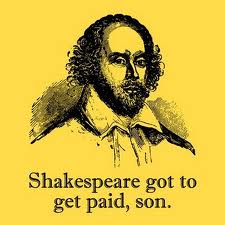Talking with the Taxman about Poetry

Is it worth doing stuff that you don’t get paid for?
Earlier this year, I was emailing a friend who had just attended a really entertaining magazine release party that I — and eight or so people — had read at, and I closed my message with “I hope I'll get to hear you read sometime — keep me posted on any events you'll be doing?”
He responded that he’d already done two readings in Chicago in the last year, so he doubted he’d be doing more in the near future, to which I said, “Sad to hear you won't be reading again anytime soon.” He replied that he reads all the time elsewhere, that it’s a good chunk of how he makes his living*, and that he just doesn’t see the point of reading in his own house all the time. He closed by citing a proverb that says, “Even the prettiest bird shouldn’t expect us listen to it sing ALL the time.”
I said, “Nice work if you can get it,” and he said that it does become work, which sometimes “f**ks it all up.” I said “I read out lot, but mostly because it's fun. I should probably be more motivated by money than I am.”
But I didn’t really mean it. I mean, I meant the part about reading out, but not the part about money-as-primary-motivator. I don’t actually agree that the best determinant of the value of most activities is the extent to which one, as Beck would put it, gets real paid for doing them.
I appreciate the need to earn a living, but it the idea that readings you get paid money for are automatically worth more than ones that you don’t itself seems sort of impoverished. I don’t think money spoils readings — the Chicago Poetry Brothel, for instance, demonstrates how readings can change for the better when money is introduced into the equation — but I wouldn’t want every single reading I ever did to operate according to a flat-fee-per-poem format.
And it’s not that I don’t understand how a capitalist economy works, or that I undervalue poetry; it’s that I deliberately don’t want to act only in a way that reinforces that economy, and that I don’t want monetary value to be the only — or even the chief — kind of value that poetry holds.
I guess the handy cautionary metaphor for writers who read even when they’re not getting paid may be Who’ll buy the chicken if you give away the eggs for free? But what if nobody wants to buy the chicken regardless? What if your aim isn’t even to sell the chicken in the first place?
A saying I like a lot is: “What is the coin of poetry’s realm? Poetry is a gift economy."
I also like thinking that maybe poetry isn’t an economy at all, but something else entirely. Perhaps it’s more of a community. And of course communities, with all their inclusivity and exclusivity, are not perfect either, as Alan Gilbert points out. But it still feels refreshing and hopeful to have spaces where people can interact and decide not to let the market determine everything.
Anyway. My question about all this is: Harriet bloggers and readers, how do you decide when to read out and when not to do so? Do you mostly say yes unless you have a legitimate scheduling conflict? Or do you say no unless you’re getting paid? Or do you have some other formula of when to say yes and when to say no, and how does that formula work?
*It seems worth noting here that — above and beyond any readings, paid or unpaid — my friend has a full-time teaching gig: salaried, with benefits.
Kathleen Rooney is a founding editor of Rose Metal Press, a publisher of literary work in hybrid genres...
Read Full Biography

